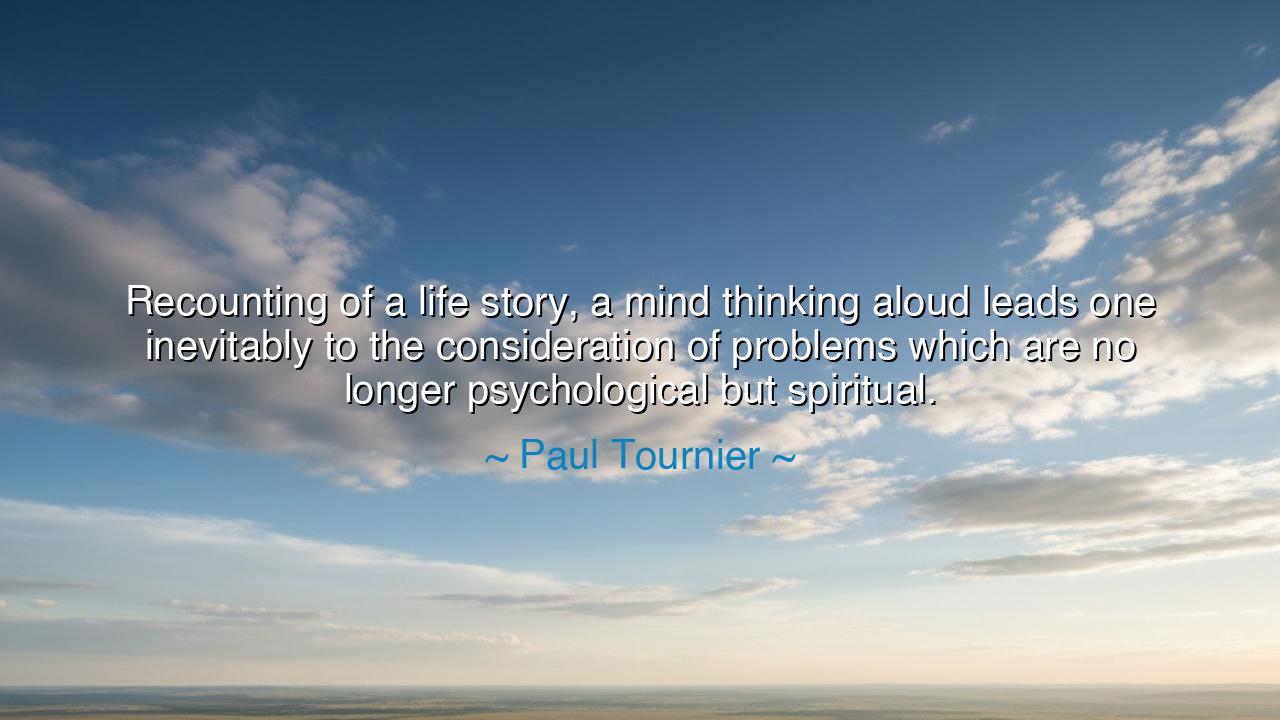
Recounting of a life story, a mind thinking aloud leads one
Recounting of a life story, a mind thinking aloud leads one inevitably to the consideration of problems which are no longer psychological but spiritual.






“Recounting of a life story, a mind thinking aloud leads one inevitably to the consideration of problems which are no longer psychological but spiritual.” Thus spoke Paul Tournier, the Swiss physician and philosopher of the soul, whose work bridged the realm of science and the mystery of faith. In this profound reflection, Tournier unveils a truth often hidden from modern minds: that when a person begins to speak from the depths of their life—when they trace their joys, their sorrows, their wounds, and their longings—they eventually reach a point where mere psychology can go no further. What remains is the domain of the spirit, where the questions are no longer about the mind’s function, but about the soul’s purpose.
Tournier’s insight flows from his lifelong vocation as both doctor and listener. As a physician, he treated the body; as a counselor, he listened to the heart. Again and again, he found that when people shared their life stories, they were not simply seeking diagnosis—they were seeking meaning. Behind every anxiety lay a cry for peace; behind every depression, a yearning for reconciliation—with others, with oneself, and ultimately with God. The “thinking aloud” of a human being, he discovered, leads to more than self-understanding—it becomes a pilgrimage toward transcendence. For the deeper one goes into the chambers of the mind, the more one discovers that those chambers open into the vast sanctuary of the spirit.
The origin of this quote lies in Tournier’s philosophy of “medicine of the whole person,” a vision he developed through decades of practice. He rejected the cold detachment of traditional science, which treated man as a machine to be repaired. To him, every patient was a living soul, woven of mind, body, and spirit. He observed that healing required not just medicine, but dialogue; not just treatment, but understanding. And when a person told their story in full—when they spoke of pain, guilt, hope, and longing—the conversation always turned from the material to the metaphysical, from the psychological to the spiritual. For beneath the symptoms of the body and the storms of the mind lies the eternal question: What is the meaning of my life?
Consider the story of Viktor Frankl, the psychiatrist and survivor of the Holocaust, whose experiences gave birth to the philosophy of logotherapy—the search for meaning as the essence of human existence. In the concentration camps, he witnessed people stripped of everything—family, possessions, dignity—and yet, those who clung to a spiritual purpose often survived. Frankl realized that man’s deepest need is not comfort, but meaning; not mere survival, but connection to something greater than himself. This truth mirrors Tournier’s insight: that when we confront the full story of our lives—its darkness and its light—we are drawn, inevitably, into the realm of the spirit, where healing no longer comes from understanding alone, but from faith, forgiveness, and hope.
Tournier’s statement also carries a timeless warning to those who would reduce man to mere chemistry or cognition. Psychology may explain the mechanisms of thought, but it cannot capture the mystery of being. The human story is not a formula—it is a sacred unfolding. Every confession, every memory, every dream points toward a truth larger than science can measure. When a person dares to speak of love and loss, of regret and redemption, they are not just analyzing their past—they are standing at the threshold of eternity. Thus, Tournier reminds us that the journey inward is also the journey upward, for the soul cannot be understood apart from its divine source.
The lesson of these words is profound: healing and wisdom begin not when we dissect our thoughts, but when we listen to the voice within that calls us toward meaning. When you recount your story—honestly, humbly, completely—you will find that beneath every fear lies a question of faith, and behind every wound lies the whisper of grace. Therefore, do not fear to speak your truth, for in doing so, you invite your spirit to awaken. And when your spirit awakens, life itself takes on new color—suffering becomes teacher, guilt becomes growth, and even death becomes part of an eternal dialogue between the soul and its Creator.
So, my child of thought and longing, remember the wisdom of Paul Tournier: “A life story, a mind thinking aloud, leads one inevitably to the spiritual.” Let your story unfold—tell it not only to others but to yourself. In your words, you will uncover the hidden threads of purpose that bind your life together. Seek not merely to understand your mind, but to know your spirit, for therein lies the peace that no analysis can grant. When you walk this inner path with honesty and courage, you will find what Tournier and the wise of all ages have found: that the ultimate questions of the heart are not psychological puzzles, but spiritual revelations, calling you home to the truth that lives within and beyond you.






AAdministratorAdministrator
Welcome, honored guests. Please leave a comment, we will respond soon